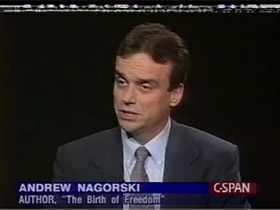Shaping Lives and Societies in the New Eastern Europe

In THE BIRTH OF FREEDOM, Andrew Nagorski provides an unprecedented personal look at the individuals and issues in the newly free nations of Eastern Europe. He takes readers into the hearts of Poland, Hungary, the Czech Republic, and Slovakia as they undergo the painful yet exhilarating transformation into modern democratic states.
Buy at








